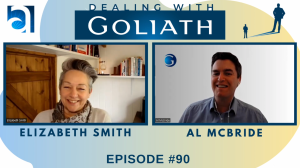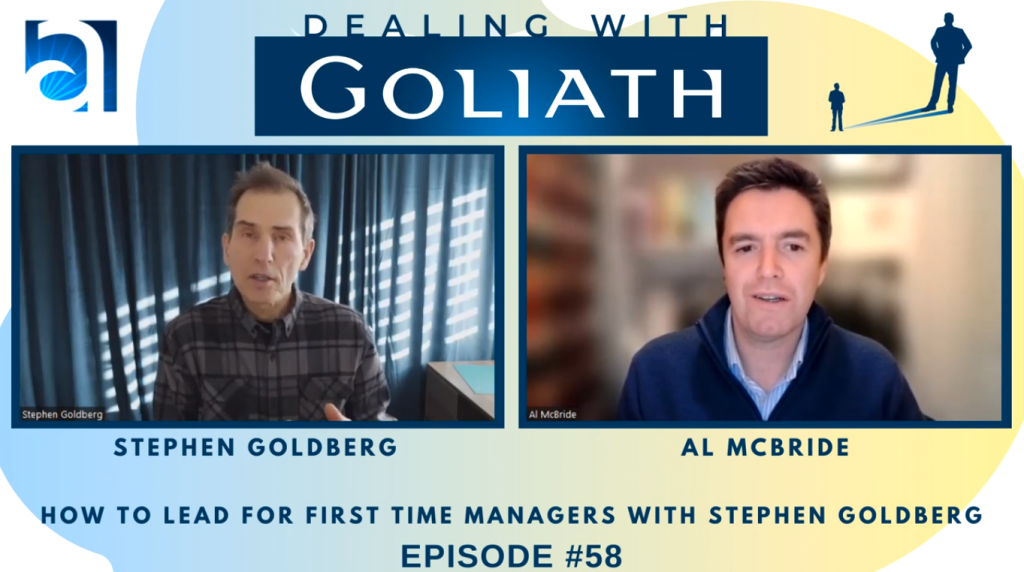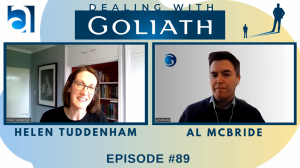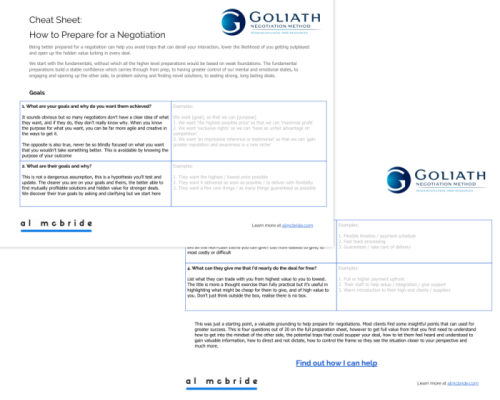

How to Lead for First Time Managers with Stephen Goldberg #058
Show Notes:
Stephen Goldberg helps companies hire the right people for the right job. He provides coaching on managing employee performance for owners of small businesses, of 10 to 150 employees, so they can free themselves to work on development projects.
Stephen gives training on leadership and teamwork to first time managers and those who have never had formal training on leadership and management before. As a result, employees can collaborate, work autonomously and contribute to continuous improvement initiatives.
Topics explored:
- Scaling up: handling increasing complexity of managing processes versus managing people and ensuring both are aligned
- The key hidden factors of managing people
- Avoid the ‘Mighty Mouse’ Syndrome
- Realise you’re not just adding ‘ingredients’ and following a recipe in business, you ARE an ingredient
- Understanding your own leadership style and how it affects others
- The cascading effect of poor delegation
- How to harness inborn strengths and overcome leadership weaknesses
- People join businesses but leave managers
- 3 relationship types and 3 doer types; we must learn from each other
- Discover your blind spot hidden from you and know what you need to work on
- Live workshops to learn this and mutually coach each other
Transcript
Al McBride 0:00
Welcome to the dealing with Goliath podcast. The mission of dealing with Goliath is to sharpen the psychological edge in negotiation, ethical influencing at the high impact conversations for business leaders who want to be more effective under pressure, uncover hidden value, and build greater connection, all while increasing profitability.
With expert guests across the business spectrum, we deliver we delivered Gems of Wisdom delving into their methods, their thinking and approach to business to life and to problem solving. This is the short form espresso shot of insight podcast interview to boost business performance using our five questions in 15 minutes format.
So my guest today is Steven Goldberg. And Stephen helps companies hire the right people for the right job, providing coaching and managing employee performance for owners of small businesses, so they can free themselves to work on development projects. He provides training on leadership and teamwork, to first time managers, and those who have never had formal training on leadership and management before. As a result, employees can collaborate, work autonomously and contribute to continuous improvement initiatives. Welcome to the show. Steven, great to have you on.
Stephen Goldberg 1:25
Thank you our pleasure to be here.
Al McBride 1:28
Great stuff, great stuff. So let’s get let’s get straight into it. So who is your ideal client? And what’s their biggest challenge?
Stephen Goldberg 1:37
Well, the ideal client, for me is a small medium sized business owner, I usually go by number of employees. So usually from 10, to 150. Employees, once you start having 10 people to manage, it starts getting more complex, perhaps you might put in a another manager or supervisor, or you may still be managing those 10 people yourself, and it becomes cumbersome and difficult to do your work and stay on track of what everybody else is doing. So I like to do in that range. And as of course the business grows, it becomes more complex. And that’s when you need to start adding some managers, team leaders to take over the range of specific departments.
Al McBride 2:33
Excellent, excellent. What we discussed a little bit in your little biography intro there, but what’s some of those big challenges that your clients face?
Stephen Goldberg 2:43
Well, I think as companies phase up their size or the scale up rather, they, you know, go from, could be a solo entrepreneur, or maybe a few co founders to, like I mentioned before having more employees. And, you know, that’s part of the things I look at business management is two funnels. One is managing processes.
And that would include even the finances part because you know, managing your cash flow and, and your profits, your inventory or services is one area that you need to be proficient in. But you also need to manage people and make sure that the two are aligned, that your processes and your people are aligned together. And so usually the process part, you can solve those problems.
Easier to some extent, because it’s more logical and define, whereas the people side is more difficult. There’s a lot of hidden factors like emotions, thoughts, motivations, all the soft skill things that are harder to determine where the issues may be, and what solution to bring.
Al McBride 4:14
Very good. And that’s fascinating. You talk about it, I love that breakdown between the process and the people because as you said, it sounds like you’re working with a lot of people who are obviously good at what they’re doing. And to use the E Myth term.
You know, there are often technician entrepreneurs that good at the actual that the key product or service, the value that the business adds, but as you said, with that success comes complexity as you’re adding people you’re adding, adding that complexity.
So when people are dealing with that, as I said, they’re they’re starting to scale up a little bit, they’re adding more people because the business are coming in, it’s required. So what are some of those common mistakes that your clients make when they’re trying to solve that problem when they’re growing, but maybe they don’t quite know what they should be doing? So what Are some of those problems? And what are sorry, I should say? What are some of those mistakes that they make when trying to scale up?
Stephen Goldberg 5:06
Well, it’s kind of like the Mighty Mouse, or Superman syndrome, is where the business owner thinks he can do everything himself, and, you know, keeps doing the job that should be assigned or delegated to, maybe a manager or a key employee. And so, if you’re doing what you need to be do doing to, you know, create the strategy for the business, act on opportunities, avoid threats, you know, the whole strategic thinking part, if you’re not putting enough attention into that, and you’re doing things that other people should be doing.
That’s a common problem that a lot of entrepreneurs don’t overcome, and could really impede the growth and threaten the long term survival of the business. So you need to give up doing what other people should be in can be doing, give up that power and control. I guess we can call it delegation, but
Al McBride 6:24
delegation. But it’s very hard because as you said, a lot of these people come from either a solo entrepreneurship or partnership or something very small, where they’re used to grabbing the reins they’re used to having to do were a whole series of different hats. And it’s a big change to some suddenly go, oh, no, that’s you, that’s for you.
That’s not your responsibility. So what is one sort of valuable free action that the audience can implement that will help them after the issue, so might solve the problem that at least point them in the right direction? What would you suggest that they do that they look at?
Stephen Goldberg 7:05
Well, they need to understand themselves, because what I’m describing in terms of giving up control, it’s really you know, there’s a word for that I mentioned before briefly, it’s delegation. And there’s lots of articles, lots of books, lots of videos, I have many on delegation, and you could turn delegation into a process, you know, step ones that were recipe step one, step two, step three.
But it doesn’t always turn out the same for everybody following the same recipe. And why? It’s because you’re not just adding ingredients outside you into the ball and mixing it, you’re part of that ingredient. So how you act and behave is really related to your leadership style, which is linked to who you are as a person. And so understanding yourself, and gaining that self knowledge of what makes you unique and drives a certain leadership style will also affect how you apply the recipe for delegation, let’s say, okay, without that knowledge, you may fail at applying that recipe because you don’t understand internally, what’s holding you back from being good at that skill, let’s say, right?
So that’s a really valuable thing is to get to know and understand yourself, your strengths, your weaknesses, your key motivation, your key fear. And that is what we integrate into actually our leadership and team development training. It’s an exercise in knowing yourself and others. It’s like a discovery exercise. And I’m actually launching in the new year that’s coming free workshop, which will teach people, their type of person and how that affects their leadership style or teamwork. Excellent. And I’ll provide a link where people can register for those, or sign up to be on the list for that those workshops. They’ll probably have one a month.
Al McBride 9:35
And that’s excellent. And you’ve answered kind of the next question is one valuable free resource, which is that the workshop so that sounds super, because, you know, I have to say that it’s something that I see with a lot of clients is, particularly this is across all sorts of businesses, whether it’s small businesses, or even in large corporations or law firms, financial services, you name it, and you see it all the way You’re particularly at that almost partner level in a law firm, it’s the same problem that you’re talking about, which is, the people aren’t delegating, and they’re not delegating.
Because they don’t, they don’t fully trust the other people to do the job as they would do it. You know, they have these issues where they think, Oh, well, it’s faster than I do. What they don’t realize is they’re often working 6080, even 90 or 100 hour weeks. And what you’re looking at when you find these people you can probably relate to this is that you actually discover they’re doing 100% of their own job, their own work, and 10% of that person’s job and 20% of that person, and 10% of that person.
So doing, they’re doing 140% of their job. And some of their colleagues are doing only 80% of their job, because they’re not giving them that work. They’re not delegating. So it’s absolutely huge. And it’s also, I’ve found, it’s also a very much a bone of contention for the staff member. know what i mean because they’re not being able to do their job and are feeling they’re contributing and being trusted to grow, to make fewer those mistakes along the way, in a safe way. And then and to grow. So it’s it’s a lose, lose, lose. It’s not a win, win win.
Stephen Goldberg 11:26
Yeah, it’s a cascading effect. You know, you’re the business owner, and you’re engaging in what you just described with your managers. Well, they learn that from their boss, and then they do the same thing with their employees. So you hinder, you create that blockage, because you’re not executing your leadership. Well, it cascades down into the company.
And so this is a big problem that the business owner like, I’ve often approached companies, small businesses to work with them. And they point to one of their employees. That’s the problem. Well, can you fix Bob, is that, and yeah, I can fix Bob, but I never tell them that I also got to fix you. It’s your problem, not Bob. And, you know, I just published while you were speaking, I was thinking of a recent video I just published, called the Win Win agreement.
And if we go back to aligning people and processes, so this is a way to engage people in an agreement of performance commitments. So you set up front with, let’s say, a direct report or a manager, and you actually have them write the performance commitments based on where you explain you want the company to be going, like your, your strategy, your thinking, then they come up with their performance commitments to support that.
And then you provide I mean, yeah, and then you provide a few the boss the support commitments. But again, you know, you could follow this process this recipe, but if you don’t look at what can hold you back from following through with this, because there has to be following follow through, then it’s going to fall to waste, it’s going to fall by the wayside, which, you know, so many things do in terms of trying to learn some better management or leadership techniques.
If you go to the library, the bookstore, and walk through and I used to do this all the time. I haven’t done it for quite a while. But go to I used to love to do this, when I was traveling, I’d go to a big bookstore, and they had many more back then, and go to the self development, the leadership section and look at all the latest books. And he’s still love learning about myself and leadership.
And you look at all these books that exist, and these articles are written every day YouTube videos. And yet, we’re filled with a world where there’s a lack of good leadership, obviously, you know, and if it was so easy just to read a book and follow the recipe, we wouldn’t be in this so many of the dire situations we’re in.
In this world, we would have solved a lot of our organizational and people problems. So going back to ourselves, we need to look at well, what is my way of approaching thing based on my type my inborn strengths and weaknesses. And what do I need? to do to overcome the weak, you know, the main weakness of my type, and, you know, find a way to apply all these learnings. Without myself standing in the way,
Al McBride 15:17
it sounds like a hugely valuable workshop, because, as you say, it’s it starts with the attitude, the interest to take that leap. Because there needs to be a little bit of bravery and humility to say that you don’t know everything you know, and that we want to learn. But It’s that continual balance, and a love for a lot of people that don’t get that balance right between between tasks versus people. And the modern workplace, you know, we fall on the task, because it’s clear as to what the goals are, it’s clear that you get it over the line, and all these other sort of questions.
But as you said, often a lot of the managers I work with fall into that trap of, they get the job over the line, but they don’t take the people with them, which creates that situation where the old saying, you know, people join companies, but they leave managers, which is a sad truth, because you’re literally not using the resources available to you.
Stephen Goldberg 16:12
That’s a good point you brought up because a lot of, you know, companies, maybe it’s shifting, but have favor hiring doers, rather than, you know, relationship types. And, you know, some people, like in my workshop on the types of people, you learn about the six classic types, and which is your classic type. And there’s really three that are relationship types, and three that are Doer types. And the key is to understand how to learn from, if you’re a doer type, like I’m a doer type.
So I need to learn some of the qualities of my closest related relationship type. So I can incorporate that in my interactions with people. And then when I’m delegating, I can be more balanced in my approach, because now I have that knowledge and that understanding of where my key weaknesses and how that affects the people I’m working with, and why I may not delegate properly, or, you know, take things back, because they’re not doing it fast. And often, they’re not doing it in the way that I want them to do it. You know,
Al McBride 17:37
it sounds like you’re really highlighting people’s blind spots that they don’t realize there
Stephen Goldberg 17:44
is huge value. When I learned this, it was a huge aha moment because I was revealed my blind spot. And I finally realized what I needed to work on, at my core at the essence of being able to progress as a leader as a manager. And without that I would be, you know, imprisoned by that weakness. To a certain degree of
Al McBride 18:14
I love it, because it’s, it echoes a lot of the stuff I deal with in negotiation where, again, negotiation, it’s about relationship versus the outcome. That is the task at hand. And a lot of very domineering people are all about the task, because the outcome I want and don’t care about the relationship. And overly accommodating people are the opposite. They’re all about the relationship, but they won’t get the thing that they need for their side. So it’s just very interesting parallels there. It’s all the similar, similar language. So just on the last question there, Steven. So what’s one question I should have asked you will be of great value to our audience.
Stephen Goldberg 18:58
Well, where do they go to sign up for my?
Al McBride 19:04
Very good. Yeah, we could certainly send that they’ll certainly be sending on the information.
Stephen Goldberg 19:10
Yeah. Besides that, what question should have asked like, one
Al McBride 19:17
question that would come to mind that often comes to mind is, can you really learn this stuff? Or is it kind of more intuitive? Can everybody learn this insight and apply it?
Stephen Goldberg 19:31
Yeah, you could absolutely learn it. The way we teach this Know Yourself approach. I mean, what’s become very common are psychometric assessments. Like you know, I guess the most famous is the Myers Briggs. There’s many that are out on the market. I actually market one from Wiley called the PX T select. It’s a great tool. I use mainly for my clients when they’re hiring. Because somehow they forget about it when it comes time to coaching people.
It’s a great coaching tool as well. But the approach that we take with our self knowledge types of people is through participative interactive exercise. So I’m going to be doing that over zoom with breakout rooms. And it’s something new, I’ve, you know, done it live workshops, and it’s been highly effective in helping people not only understand themselves better, but understand their team better, too. And easily recall the qualities of each person associated with their type and their weakness.
So they can actually start mutually coaching each other. And this could be for team members as well. So I found that to be highly practical, the way we teach it, versus somebody filling out a questionnaire and then getting a report. And what are you going to do carry around? Everybody’s reports with you? Oh, you’re this type with so many letters, like the Myers Briggs, you have all these? And all? Yeah, I mean, remember your qualities.
Whereas with the approach we use, it’s easily much easier to recall the qualities associated with each classic type. And we actually use animals to, so animals are easier to oh, he’s this animal. There’s only three. Okay, yeah. So it’s just a way to get the process going.
Al McBride 21:47
Sounds like a fascinating workshop, I might defend myself, actually. And that’ll be very interesting. I’m quite excited about that. And that will be going on in January and February.
Stephen Goldberg 21:58
The first one is scheduled for January 24.
Al McBride 22:02
Okay, okay. Very good. And where can people reach out and find you, Steven, I’ll have some links, obviously, beneath this episode, both on YouTube,
Stephen Goldberg 22:10
on my website, obviously, but also on YouTube. So I publish weekly video on YouTube for the last probably eight, nine years. So I have quite a few videos on YouTube.
Al McBride 22:29
Just I covered a lot of your website and your YouTube channel there.
Stephen Goldberg 22:34
So just search my name, Steven Goldberg. And you’ll use I should come up. And there’s all kinds of tips on leadership, team development, managing employee performance, hiring and selection. And I also make available free tools that people can download.
So things like a job description, template, simple ones, a goal setting form a year in review, and you’re planning ahead, PowerPoint, workbook. Tools like that, you know, a training needs analysis worksheet. So a lot of really, there’s a video or an article to go along with it that people can sign up and download for free and get access to so that’s another free resource that I offer people.
Al McBride 23:29
Excellent. Well, that’s super stuff. Thank you. And we’ll link to plenty of those resources, certainly your website and your YouTube channel. But if you want to search for Steven and a huge amount of resources, I’ve looked at some of your videos in the past and they were excellent. Just Steven Goldberg, type it into YouTube and you’ll find them on his his dozens and dozens, if not hundreds of this case. hundreds of videos. Excellent stuff. So thank you so much, Steven, thanks for coming on the
Stephen Goldberg 23:57
show. Welcome. Thank you for having me. It’s been a nice discussion. And hopefully it brought some value to people.
Al McBride 24:04
I’m sure it did. Thanks, Stephen.
Stephen Goldberg 24:06
Okay, take care. Bye bye. Life
Transcribed by https://otter.ai
Resources
Website: Optimus Performance Blog
YouTube Channel: Stephen Goldberg Optimus Performance
Stephen’s Know Yourself & Others Workshop January 24th 2023
Connect with Stephen
Ready for more:
If you’re interested in more, visit almcbride.com/minicourse for a free email minicourse on how to gain the psychological edge in your negotiations and critical conversations along with a helpful negotiation prep cheat sheet.


